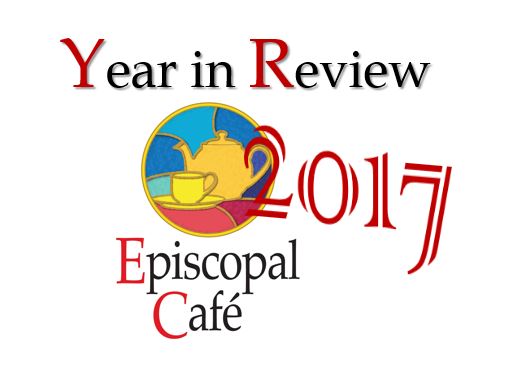Here are some of highlights of the past year at the Episcopal Café
Celebrating ten years with a new look

2017 marked ten years of the Episcopal Café. Our site’s genesis came a year prior when Jim Naughton began blogging about the short-lived TV dramedy The Book of Daniel. We also introduced a new layout to this website which was well received (thank you) but we were also the subject of an extended brute-force denial of service hack. A lot of our resources (financial and server space) were dedicated to addressing the attack which has left our site operating slower than we would like. The biggest hit was financial and it has been quite a setback for us. We’ve recently added advertising to the site to help raise more funds, but if you’re needing to make a financial donation at the end of the year, please consider supporting the Episcopal Café.
All Trump, all the time

Like much of the media landscape, the American president figured in a surprisingly wide range of stories. His ability to insert himself into things extended to the church as well and nearly right from the get-go. There was controversy around the National Cathedral’s hosting of the National Prayer service for the incoming president as well as the President-elect’s desire that there be no preaching at that service. There was also a heated debate across the online episco-sphere on whether or not the new President should be prayed for during the weekly Prayers of the People. Michael Curry, the Presiding Bishop weighed in on that one;
We recognize that this election has been contentious, and the Episcopal Church, like our nation, has expressed a diversity of views, some of which have been born in deep pain.
There has been much discussion, and some controversy, about the appropriateness of the Washington National Cathedral hosting the Inaugural Prayer Service this year, and of church choirs singing at inaugural events.
Underneath the variety of questions and concerns are some basic Christian questions about prayer: when I pray for our leaders, why am I doing so? Should I pray for a leader I disagree with? When I pray what do I think I am accomplishing?
On one level these questions seem inconsequential and innocuous. But real prayer is not innocuous. It is powerful. That question can become poignant and even painful as it is for many in this moment, given that some of the values that many of us heard expressed over the past year have seemed to be in contradiction to deeply-held Christian convictions of love, compassion, and human dignity.
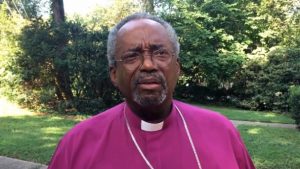
So, should we pray for the President?
We can and, indeed, I believe we must pray for all who lead in our civic order, nationally and internationally. I pray for the President in part because Jesus Christ is my Savior and Lord. If Jesus is my Lord and the model and guide for my life, his way must be my way, however difficult. And the way prayer for others is a part of how I follow the way of Jesus.
The Church also added its voice in opposition to moves by the administration that worked against long-standing commitments of the church. There was the decision to withdraw from the Paris Accord on climate change, an urgent problem of creation care.
Faith bodies like the Episcopal Church occupy a unique space in the worldwide climate movement. In the context of the United Nations, the UNFCCC and the Paris Agreement, we are an international body representing 17 countries in the United States, Latin America and the Caribbean, Europe, and Asia and the Pacific. We also are a provisionally admitted observer organization to the UNFCCC process, empowered to bring accredited observers to the UN climate change meetings. Furthermore, the Episcopal Church is a member of the worldwide Anglican Communion, the third-largest Christian tradition, and we remain committed to ensuring that Anglicans everywhere are empowered to undertake bold action on climate change mitigation and adaptation.
We know that caring for God’s creation by engaging climate change is not only good for the environment, but also good for the health and welfare of our people. The U.S. is currently creating more clean jobs faster than job creation in nearly every other sector of the economy, and unprecedented acceleration in the clean energy sector is also evident in many other major economies.
Another was the decision to recognize Jerusalem as the capital of Israel, a decision many see as a stumbling block to peace. The church’s statement on this affirmed the view of those closest to the situation and spoke of the widespread opposition of the majority of the world’s Christian leaders.
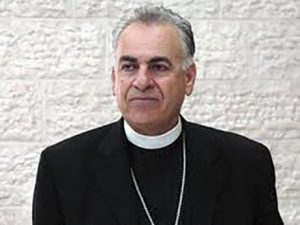
Since 1985, the Episcopal Church has had policy opposing the movement of the United States Embassy from Tel Aviv to Jerusalem. Our policy states that the status of Jerusalem must be “determined by negotiation and not by unilateral action by any one community, religion, race or nation.”
+Archbishop Suheil Dawani, Archbishop of the Episcopal Church of Jerusalem and the Middle East, has joined with patriarchs and heads of local churches in Jerusalem in opposing this move. We support Archbishop Suheil and value his perspective and expertise.
And other civil and social justice issues

The church also took a stand in opposition to the proposed bill (ultimately defeated) that would have eliminated the Affordable Care Act (Obamacare). In a letter from the Office of Government Relations, Director Rebecca Linder Blachly wrote:
As you may know, our Church upholds affordable and effective health care for every American, backs Medicaid as an essential program for low-income families, and supports adequate government funding for research and medical care for women’s health. Our vision for America includes a compassionate and economically viable health care system that protects low-income, elderly, and at-risk populations.
The provisions outlined in the American Health Care Act regrettably fall short of the health care standards that we maintain are essential to a thriving and beloved community.
Protests

In the United States, more people took to the streets in protest than at any time since the 1960’s movements for civil rights and against the war in southeast Asia. Among the protests was one in Los Angeles in April seeking to highlight issues around immigration and immigration enforcement that led to the arrest of 35, including an Episcopal priest – the Rev Mike Kinman who said;
“ICE is an active danger to members of our community — both our community at All Saints Church and our wider communities of Los Angeles, California and the nation, its targeting of people for deportation is based on race and class. It splits up families, has communities living in fear and exacerbates the already shrinking trust between communities of color and police and government authorities.”
Many Episcopal clergy joined other clergy in opposition to white nationalists who showed up in Charlottesville, Virginia after a call from the bishops of the diocese of Virginia to go to Charlottesville to participate in non-confrontational and prayerful opposition to the rally.
Some counter-protesters clashed with the white supremacists near a statue of Thomas Jefferson, but many remained in a peaceful prayer vigil at St. Paul’s Memorial Episcopal Church. Clergy from many different faiths and from across the nation were present, answering a call from the bishops of the Diocese of Virginia. For some time, the white supremacists surrounded the church, but they were eventually disbanded by police for unlawful assembly. Traci Blackmon, a United Church of Christ minister tweeted that the police weren’t letting people inside the church go out for their own safety. The Rev. Winnie Varghese asked those gathered in the church to invoke in prayer “those upon whose shoulders you stand today, those whose footsteps you follow.” “Let’s take that Love to the streets,” she said in the conclusion of her prayer.
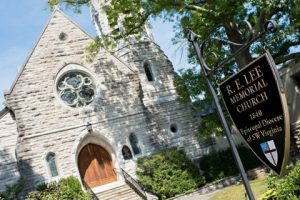
Shortly after the protests in Charlottesville resulted in the death of one of the protestors by a white nationalist, the vestry of the Robert E Lee Memorial church in Lexington, VA dropped the name (that honored a slaveholder and military leader of a bloody rebellion against the United States for the purpose of maintaining race-based slavery) in favor of the parish’s original name, Grace Episcopal Church.
Though protests large and small marked 2017, perhaps one of the smallest was also one the most poignant. While white-nationalist Richard Spencer led a rally at the University of Florida, Laura Ellis, a music professor at the university, went up 11 flights of stairs in the school’s carillon tower on Thursday to play “Lift Every Voice and Sing,” the NAACP’s official song and a common song from the Civil Rights era.
“I think it was an appropriate time to play this song, to show our support for those who need it the most,” Ellis told CNN.
Gun violence
In the US, gun violence continues to undermine our domestic peace and tranquility, with mass shooting regularly taking the lives of neighbors and loved ones at a rate and frequency known nowhere else in the world among nations notionally at peace. In the wake of a horrific mass murder in Las Vegas in October, Bishops United against Gun Violence had this to say;
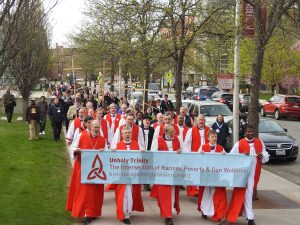 It has become clichéd at moments such as these to offer thoughts and prayers. But as Christians, we must reflect upon the mass killings that unfold with such regularity in our country. And we must pray: for the victims, for their loved ones, for all who attended to the victims in the immediacy of the shooting, for the first responders who do so much to mitigate the awful effects of these shootings, and for the medical personnel who will labor for many days to save the wounded. We must also enter into the sorrow of those who are most deeply affected by our country’s cripplingly frequent outbursts of lethal gun violence. We must look into our own hearts and examine the ways in which we are culpable or complicit in the gun violence that surrounds us every day.
It has become clichéd at moments such as these to offer thoughts and prayers. But as Christians, we must reflect upon the mass killings that unfold with such regularity in our country. And we must pray: for the victims, for their loved ones, for all who attended to the victims in the immediacy of the shooting, for the first responders who do so much to mitigate the awful effects of these shootings, and for the medical personnel who will labor for many days to save the wounded. We must also enter into the sorrow of those who are most deeply affected by our country’s cripplingly frequent outbursts of lethal gun violence. We must look into our own hearts and examine the ways in which we are culpable or complicit in the gun violence that surrounds us every day.
And then, having looked, we must act. As Christians, we are called to engage in the debates that shape how Americans live and die, especially when they die due to violence or neglect. Yet a probing conversation on issues of gun violence continues to elude us as a nation, and this failure is cause for repentance and for shame. It is entirely reasonable in the wake of mass killings perpetrated by murderers with assault weapons to ask lawmakers to remove such weapons from civilian hands
Bad Bishops

The church wasn’t solely focused on issues of civic life of course, it also made time to deal with internal issues. One story that unfolded across the whole year was the saga of St James the Great in Newport Beach, CA and the ministry of bishop John Bruno. After recovering the property from those who tried to leave the Episcopal church some years ago, a new congregation was founded and was growing, with self-sufficiency on the near horizon. They were taken aback and shocked when Bishop Bruno abruptly closed the parish and sold it to developers, citing unsustainability. The congregants banded together to save their parish and their complaints led to an ecclesial trial which confirmed them and led to the suspension of ministry for Bruno.
In a damning statement, the panel wrote that Bruno’s actions were unscrupulous and un-godly,
“Although the building is an asset, Bishop Bruno is not the CEO of a commercial, for-profit company. The “asset” is a consecrated church that should be used for the glory of God and worship by a congregation, rather than sold to build condos and then left idle and useless after the sale fell through, almost two years ago. To keep a consecrated church building locked for no reason is to engage in Conduct Unbecoming. Bishop Bruno’s conduct has created immense public outcry, town hall meetings, city council meetings, neighborhood surveys, breaking of contracts, lawsuits and media attention. Having the church locked has created disorder and prejudiced the reputation of the Episcopal Church.”
To the disappointment of all, the bishop coadjutor, John Taylor, then said he had no choice but to go through with the sale after all despite the strong urgings of the hearing panel. In the end the buyers pulled out, the diocese opened the church for worship and the people of St James and their priest, Cindy Vorhees, have entered into an agreement which will hopefully put them back on track.
The Communion holds…still
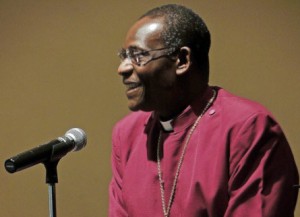
Internationally, the Anglican Communion trundles along with no formal breaches. Most formal structures of the Communion remain strong, though the Primates continue to experience some dissension from within. Though some voices have suggested the Episcopal Church be done with the whole project, our Communion partnerships bring much good on the ground and we stand as a beacon to many across the world who hope to see things like full inclusion of LGBT+ persons and marriage equality in their churches someday. Unsurprisingly, it is in the UK that two important events with a bearing on the future of the Communion happened. The enactment of marriage equality in the Scottish Episcopal Church shows that this is a movement that transcends borders and the ordination of nine men by the GAFCON backed Anglican Mission in England (AMiE) and the arrival of a missionary bishop (courtesy of the ACNA) offered a direct challenge to the Archbishop of Canterbury which may (hopefully) sharpen his response to the divisive actions of GAFCON.
In a response to a GAFCON statement decrying the SEC’s move, the Primus of the Scottish Episcopal Church. The Most Revd David Chillingworth, said;
“In June, the General Synod of the Scottish Episcopal Church will reach the final stage of consideration of changes which would make possible same-sex marriage in our churches. The news that GAFCON intends to send a missionary bishop to Britain is regrettable. The Anglican Communion functions as a global communion on the basis of respect for the territorial integrity of each province. This move is a breach of that understanding.
The Scottish Episcopal Church is working closely with those who find this proposal difficult to accept. Whatever the outcome may be, it is our intention to be and to remain a church which honours diversity.”
Schism affects close to home
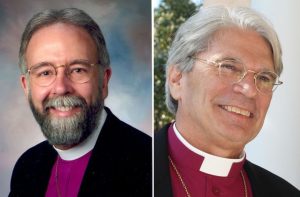
The fallout from our own church’s decision to open ourselves to the full inclusion of all God’s people continues to unfold as well. Last year property disputes in the diocese of San Joaquin in California were finally concluded in favor of the Episcopal Church. This year, a similar result was reached in property disputes in South Carolina. However, the leaders of the breakaway group in South Carolina, unlike their peers in California have not yet reached the point where they are willing to accept the court’s decision. A trademark dispute over use of the name “Episcopal Diocese of South Carolina” is still pending in Federal Court with arbitration scheduled for January 2018.
The final decision related to the similar property disputes in the diocese of Fort Worth remains to be settled. The Episcopal Diocese of Fort Worth took some hope from the South Carolina case though and issued a statement and made a filing in the case to the Second Court of Appeals seeking to dispel misinformation spread by the breakaway group there. In part, it said;
Just like in our case, the South Carolina breakaways claimed to take an Episcopal diocese and congregations from The Episcopal Church. The South Carolina Supreme Court made clear: only The Episcopal Church can decide who controls an Episcopal diocese and congregations, even in a case about property. The Texas Supreme Court said the same thing. So did the U.S. Supreme Court.
This is critical. The breakaways in our case admit that the property they took is in trust for the Episcopal diocese and congregations. Only The Episcopal Church can decide who controls the Episcopal diocese and congregations. The breakaways must return the property to the only authorized representatives of the Episcopal diocese and congregations: the Episcopal Plaintiffs.
Reformation 500
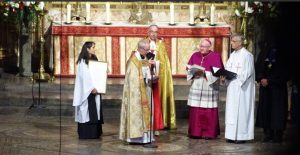
2017 also saw the 500th anniversary of Martin Luther’s unintended launch of the Protestant Reformation which was celebrated in an ecumenical service at Westminster Abbey where in his sermon Archbishop of Canterbury Justin Welby weighed the positives and negatives of the Reformation;
Well, said Eeyore to Tigger, or the historian to the enthusiast. For each of the things that came through the Reformation – good as they are, precious beyond compare even – for each there is also a dark side.
But he also pointed out its invitation continuing reformation a;nd an effort to aspire to unity in Christ
The Reformation was a gift of God, not only in itself but as a sign of the faithfulness of God to His work of revealing the good news of Jesus to a world in need, and the faithfulness of God in using His church despite our failings.
What do we do with the gift today? Will we be willing ourselves to be reformed again and always, setting aside our differences because we are caught up in the grace that is found through faith?
Will we find from God alone the strength and grace to be a united blessing to His world, so that our witness of unity in diversity overcomes our fears of each other?
Will we seize afresh in confidence the hope that God who never abandons His church will again reform us, so that the world may see that Jesus came from the Father?
Christian Unity
In working towards that unity the Episcopal church moved closer to a full communion agreement with the United Methodist Church. One potential kink in the road towards that though may be a potential schism within the UMC over the issue of marriage equality.
#MeToo
One of the surprising events of the year was the widening cultural movement against sexual abuse in the workplace that was kicked off by revelations about Hollywood producer Harvey Weinstein that led to his firing from the company he founded with his brother. An associated hashtag campaign, #MeToo, encouraged women to share their personal experiences of sexism and abuse was eye-opening to many. In a moving essay, The Rev Cat Healy shared her own experiences as a woman in the church. In her post titled A Taxonomy of Creeps she wrote;
Reading through hundreds of #metoo stories this week, I caught myself thinking that I was lucky.
Lucky” that I have never been sexually abused or raped. “Lucky” that my experiences of sexual harassment have been relatively minor. “Lucky” that I can tell stories about those experiences without traumatic flashbacks or the threat of harm.
If you are a clergy woman or femme reading this blog, you don’t need me to tell you that sexual harassment and assault are problems in the church. You probably got a fresh reminder of that last Sunday, when someone gave you a hug in the receiving line that lasted just a little too long.
And yet.
And yet, I feel kind of like the Ancient Mariner: I have been working in the church for a decade now, so even if no one wants to hear them, I have my own set of stories to tell. I’ve picked a handful to share with you here, and included the details I always want to know when I hear these stories: what I did and whether it worked.
And 2018?
Well, this is my third year doing this year in review for the Café and I can assure you that this movement of our planet in its repetitive journeying around the sun will likely not bring abrupt change but the continuation of forces already unfolding. The church continues to face an identity crisis as it struggles to accommodate itself to a changing changed role in western culture. Overall I’m pretty positive on the future of the Episcopal Church, though I don’t expect it to resemble much the church I first entered only a little more than twenty years ago; history shows that faith traditions are difficult things to kill outright.
General Convention is the big event for 2018 in the life of the Episcopal Church. Unlike for the past few, there doesn’t seem to be a sense of big decisions to be made. Instead, it feels like a GC for continuing and expanding important decisions already made. Continuing to expand marriage equality, reorganization of church structures (even General convention itself), funding evangelism and church plants, and, of course, a potential Prayer Book revision seem to be the likely focus points from here.

